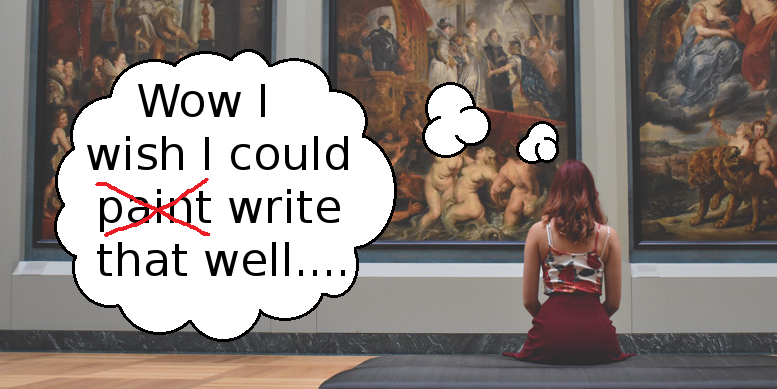Last week on Masterpiece Monday we looked at a great example of not needing to spice up the word “said.” This week I’d like to start a series that I call Awesome Authors DO-ing Writing DON’Ts.
When we read articles about writing online or attend writing groups and such, we’re often told NEVER to do certain things. Never tell always show, never use the passive voice, never use ellipses, never use more than two adjectives at a time, etc. etc.
While many of those are usually good advice, they can be a real hindrance if stuck to all the time. I talked previously about how forcing myself to always show in my writing and never tell held me back.
Sometimes, you do need to tell. You do need to use the passive. And you do need to… wait for it… use an adverb.
I know, blasphemy right? Even just last week we talked about how using adverbs in dialogue (“he said happily” etc.) can turn your writing from snappy to slow as molasses in seconds.
But that’s just it – sometimes you do want to slow down your writing. Or sometimes you need to convey exactly how a character is saying something in order to get across the hidden meaning behind their words. And adverbs can be perfect for that.
One of the books that really showed me the power of adverbs is Harry Potter. Here’s an abbreviated version of one excellently-written scene that uses adverbs to convey the tense mood perfectly. It’s right at the beginning of the book, when Mr. Dursley attempts to ask his wife if all the crazy stuff he’s seen all day might in any way be connected to her sister (adverbs underlined):
He cleared his throat nervously. “Er – Petunia, dear – you haven’t heard from your sister lately, have you?
“No,” she said sharply. “Why?”
He said, as causally as he could, “Their son – he’d be about Dudley’s age now, wouldn’t he?”
“I suppose so,” said Mrs. Dursley stiffly.
“What’s his name again? Howard, isn’t he?”
“Harry. Nasty, common name, if you ask me.”
“Oh, yes” said Mr. Dursley, his heart sinking horribly. “Yes, I quite agree.”
That’s almost an adverb per sentence! If J.K. Rowling had brought her manuscript to a writer’s group, chances are all of them would’ve been crossed out in red ink and she would’ve gotten a lecture about how good writers NEVER use adverbs.
Except that’s not true. The dialogue here isn’t supposed to be quick and snappy, it’s supposed to be slow and painful, so we can feel the torture that Mr. Dursley is going through. Using adverbs to slow it down a bit, while adding some juicy description as well, is the perfect way to accomplish that.
When it comes to writing DON’Ts, it’s not about never using them, but knowing WHEN to use them. Just like we shouldn’t use adverbs in every single sentence, we shouldn’t eat chocolate cake for every single meal either. But sometimes a little bit of chocolate cake is awesome, even necessary – if you show up to an elementary birthday party with celery sticks instead of cake, then you’d better be prepared to be whacked like a pinata.
So, I guess that metaphor makes sense? I don’t know, but I suddenly having a incredibly unbelievable craving for some freshly-baked adverbs chocolate cake.
(Featured image via GAHAG, edited by me)

Comments are closed.